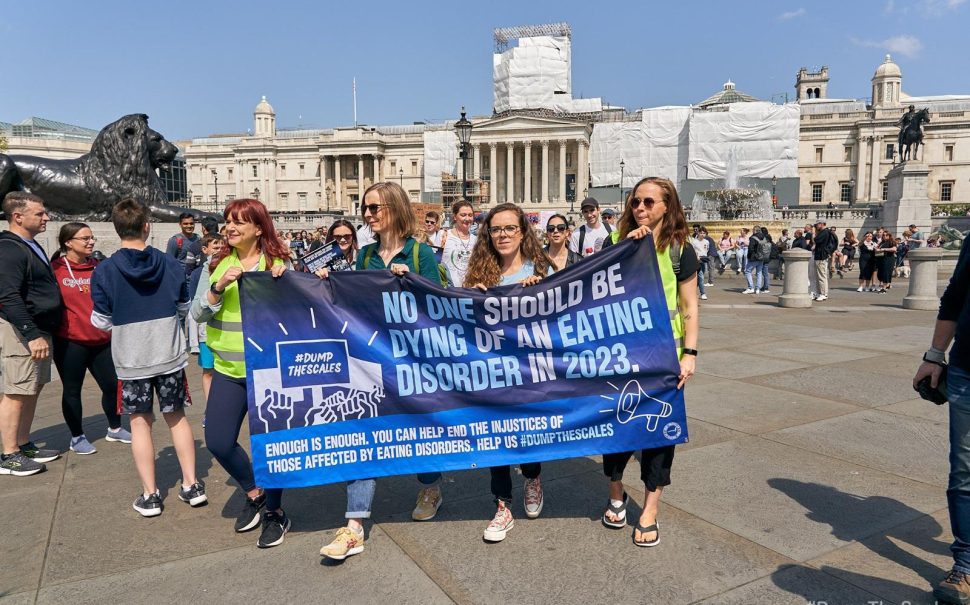At its heart the treatment of eating disorders seems simple, eat an appropriate amount of food and you will recover.
Scientists have made remarkable progress in understanding the underlying biology of eating disorders (EDs) and creating early intervention strategies but they are still stumped as to why some long term sufferers recover and others don’t.
There is a remarkable consistency in what motivates people to recover from EDs, however most need long term support.
Despite the nuance of individual stories three common motivations amongst those we spoke to who had recovered recurred:
- Push factors such as pressure from loved ones or fear of the illness
- Pull factors developing authentic relationships, ambition and purpose
Julia Lovely, an ED dietician of 21 years, said: “I can tell you what doesn’t work and that’s doing it for someone else.
“A lot of people come into treatment because they want to stop hurting those around them and that has to evolve or they will relapse.”
Jodie Mainstone a ED specialist psychotherapist of 19 years echoed the necessity of moving from push to pull factors.
Mainstone explained that this can take a significant period of time as the patient has to be contained long enough to even consider building secure and trusting a relationships, a career or travelling the world.
She said: “Often these things haven’t even crossed a person’s mind, when they enter treatment they haven’t found these reasons, they only have fear.”
The pain of the illness has to become greater than without.
But there also needs to be an experience of the without, as this is often absent in long term sufferers whose lives have been engulfed by the illness compounding any existing trauma.
There is also a biological factor.
Lovely pointed out that when patients are severely undernourished, regardless of weight, there is still damage to cognitive function which narrows thought processes, encouraging obsessive thought which in turn further embeds the obsessive thinking at the heart of the illness.
It is fundamental that before therapy or other holistic treatment can work properly, someone is nourished and this takes time.
Lucy, 24, who is in recovery from anorexia and bulimia echoed the experts.
She said: “It was only leaving starvation mode that made me cognisant of my ability to get better.
“Something I never understood was the need to refeed, I thought I could just do the mental work.
“The physical and mental repercussions of starvation and purging in terms of fat mass on the brain meant my brain literally couldn’t function.
“I couldn’t grasp the concept of a better life, my brain was unable to do that.”
Lucy, whose mother is a GP and father is a surgeon described how she was shamed for being overweight as a child.
She was under NHS care as a teenager, but her weight wasn’t low enough to qualify for inpatient treatment.
Lucy said: “This was extremely damaging, it confirmed that I wasn’t good enough at my illness so I doubled down.
“With what the NHS was offering me, I would have died.
“I would have killed myself.”
Lucy also struggles with alcoholism and anxiety, so when she turned eighteen she was rejected by three different services saying they couldn’t cater for all of her needs.
Over half of those with EDs have dual diagnosis, ranging from mood disorders to autism, to Attention Deficit Disorder.
She continued: “I was extremely lucky that my parents at this point paid for private treatment, this gave me the time I needed.
“You often feel worse at first, your crutch has been removed, but it held me while I worked through it to the point where my brain was capable of contemplating a better life.
“I made friendships, real ones.
“It was gradual, there was no lightbulb moment.
“I was in faux recovery but there was a gradual process of realising my life was better, and that I could only get where I wanted to go in life, if I ate otherwise my brain doesn’t work.”
Lucy had dropped out of school and not finished her A Levels due to her illness.
She has now completed a masters degree and works in marketing.
Josie has recovered from anorexia as a teenager, and later drug addiction.
She firstly was referred to an ED children’s ward, where she gained weight but there was minimal therapy and she relapsed.
Josie was then placed in a general psyche ward in hospital for six months, where they refed her but she said there was minimal therapy.
She said: “When I was in that psyche ward, it was the only place I had felt safe in years.
“I made really good friends and we giggled and smoked cigarettes out the window, they were people I really cared about and loved.
“This took time though, I was scared, I realised I had lost control and my ED was going to kill me and there was an amazing nurse who sat with me through all my meals.
“She listened to me, held me and gave me the space to start feeling again.
“If I was crying over a potato, we would recite what I could do if I got better travel, boys, parties and over time I started to hope.”
Her mother, who died when she was nine, was a professor and she said academic achievement was expected.
She continued: “When I eventually left, other things became important I come from a super academic family and I needed to get good grades so I needed to eat.
I met a boy and fell in love and didn’t want to fuck that, and be the weird girl who couldn’t eat.
“It was bizarre, I lose my liberty, years of education and my relationship with my family.
“None of that mattered to me, it was only when I felt held, and was forcibly fed that things changed.”
When asked what keeps her from relapsing she said: “Because it’s horrific, you are consumed 24/7 with numbers and panic.
“It’s so much more visceral than alcohol or drug addiction, the treatment is horrific if necessary and when you have a peep how life can be it’s not worth it.
“You can’t dabble, the loss of control is eventually absolute.”
Josie has made a full recovery from her ED and other addictions, and now works as a support worker for vulnerable women.
Occasionally, a disordered thought pops up at which point she goes back to basics and literally writes down what she would lose if she restricted.
Dr Bryony Bamford, clinical Psychologist and Director of The London Centre for Eating Disorders and Body Image commented: “Motivation is is not enough to evoke lasting change for most people and this is where specialist treatment is needed to help people harness evolving motivation and convert it into cognitive, emotional and behavioural changes.”
Long term, specialist treatment is understandably expensive, and difficult to fund on the NHS especially as many services are under significant pressure.
Since COVID there has been an epidemic in ED cases with data from London’s mental health trusts revealing a 158% increase in adolescent referrals and a 56% increase in adult referrals in the last six years and the NHS is struggling to provide appropriate care.
The government set target waiting times for under 18’s at 95% of urgent cases being seen within a week and 95% of routine cases within a month for children and young people by 2020.
These targets have not been met, dropping from 95% and 95% respectively in 2019-2021 to 65% in 2021-2022 and were at 78.7% for urgent cases and 82.5% of routine cases last year.
A freedom of information request by London City Hall revealed roughly 65% of adult cases are seen within a month but many wait over a year.
Hope Virgo, author and ED campaigner who started the national ‘dump the scales’ campaign added: “They can’t seem to look at early intervention and people who have had eating disorders for a very long time.”
City Hall’s investigation also revealed many are having to resort to private treatment with two patients we spoke to saying they or their loved ones had to remortgage their home to pay for private treatment.
Baroness Parminter, a peer in the Lords, who has campaigned for better ED services since her daughter developed anorexia said that there is still a stigma around the illness, as it is seen as a choice by politicians and many medical professionals.
She said: “Politics is about choices, and many difficult choices are having to be made but if you compare the prevalence of EDs and the levels of treatment it’s laughable.
“There has long been a disparity between physical and mental healthcare, the latter takes too long and is harder to understand.
“There is also a stigma around EDs, they are seen as the reserve of white girls who want to be thin.
“They are seen as a choice.”
She points out that schizophrenia, whilst a worthy cause, affects a fraction of the numbers who have ED’s but receive more funding, she argues because the illness isn’t seen as a choice.
Dr Bryony Bamford, clinical Psychologist and Director of The London Centre for Eating Disorders and Body Image, commented: “Motivation is is not enough to evoke lasting change for most people and this is where specialist treatment is needed to help people harness evolving motivation and convert it into cognitive, emotional and behavioural changes.”
Essentially, most people start trying to recover due to fear, and most need long term support to gain some experience of relationships, work and purpose to maintain their recovery.
Featured image credit: Hope Virgo





